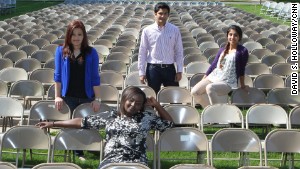Rome, Georgia (CNN) -- Mireille Kibibi's march to the graduation stage at Berry College was tough -- laden with the burdens of war.
As a little girl, she fled civil war in Burundi and escaped to neighboring Rwanda in 1994, the year of the genocide. In the chaos, she was separated from her mother, whom she has never seen again. Her father died a few years later.
Kibibi made it to the United States with her grandmother in 2005 and resumed school after missing fourth, fifth and eighth grades.
Now she was about to receive a bachelor's degree in accounting.
She felt all those things a college graduate feels: the relief that exams are over. The excitement of starting life in the real world. The joy of making your family proud.
But Kibibi's graduation was also filled with longing.

On this humid Saturday morning, as dark clouds delivered drizzle over North Georgia, Kibibi, 23, sat nervously among 377 classmates.
The rows and rows of folding chairs had been arranged on the south lawn days in advance. She wished her father and especially her grandmother could see her now, resplendent in the knee-length red dress she'd ordered on eBay. Her grandmother, who raised her, had died a while back.
"She's watching you," her friend Fatima Bostan-Ali reassured her.
"She's proud," said another friend, Lima Naseri.
Kibibi cherishes the support. She knows her friends understand. They are from Afghanistan and also have traveled uneasy paths to graduation day.
The women were part of a group of seven refugee students who came to Berry in 2009. The gaps in their education, their lack of English skills and the emotional scars in their lives had set them back. They didn't all meet the academic criteria to make it into Berry.
But Berry took a risk and opened its doors. Even the head of the university doubted whether all seven would make it through four years of college.
"It was our big gamble to give them a chance," Berry President Steve Briggs said.
On Saturday, Berry's gamble paid off.
Taking a risk
At the start of the 20th century, Martha Berry founded Berry Schools on Christian principles, aiming to help academically able but poor children of the rural South. The schools encouraged students to study hard and work to pay for their education. Berry's schools eventually grew into the eponymous college in the Georgia city of Rome.
Among Berry's many fans were President Theodore Roosevelt and auto magnate Henry Ford, who built a castle-like dormitory on the campus.
Berry sits on 26,000 acres of lush landscape; it's not unusual to see deer walk right up to the buildings. And yet it is small, with only about 2,000 students, and classified as residential because most students live on campus. Many work at the college to help pay their $30,000 annual tuition.

It was the community atmosphere that first attracted Naing Oo, the son of political dissidents from Myanmar, also known as Burma. The family fled political persecution in their junta-ruled homeland when Oo was in the fifth grade.
Oo learned about Berry at a college fair. Atlantan Barbara Thompson, who knew Oo through a school she founded for refugee kids, championed his cause.
She knew about his past.
Oo's father was part of Myanmar's pro-democracy movement. His mother often used duct tape to attach pots and pans to her husband's chest to protect him when soldiers opened fire on demonstrators.
Oo's father, a marine engineer, escaped the country and landed in New York, where he found work at a Laundromat in Chinatown. He made only $4 an hour but saved enough to hire a lawyer so he could bring his family over.
When it was time for everyone to leave Myanmar, Oo's mother told authorities she and her children were going on a shopping trip to Singapore. The flight attendants on the plane couldn't understand why she was crying.
Later, Oo, 22, discovered that the family's documents, including asylum papers for the United States, were hidden in his bag. Authorities were less careful in checking children's luggage.
Even now, he says, he gets chills when he thinks about how he carried his family's future.
Oo's decision to go to Berry spread among other students connected through Thompson's school for refugees. In the end, seven of them from four countries -- Burundi, Myanmar, Afghanistan and Liberia -- were admitted to Berry.
Thompson knew that they did not have the SAT scores or the money to make it to a college like Berry, but she was moved by their determination to make it in America, a land that Oo said was as different from their homelands as Earth is from sky.
Thompson kept thinking of what one student's mother had told her: She'd dreamed of education for her girls in Afghanistan but then the Taliban came.
Thompson's dream was to see these students, who had survived extraordinarily challenging circumstances, succeed.
She believed Berry would provide the perfect environment. It was small and intimate. The students would be able to regain a sense of community lost in their process of resettlement.
She reached out to Briggs and other Berry officials and shared her hopes for the refugee students.

Berry, a predominantly white Protestant college, had not had students like these before.
But admitting them was in line with the same kind of calculated investments that Martha Berry had made in students in her day, giving boys and girls trapped in poverty an opportunity to better their lives.
Briggs, the college president, knew that it would take an enormous amount of resolve and resiliency on the part of the refugee students. It would be an experiment.
Berry had just started a program that let students work their way through college with the hope they would graduate debt-free. Why not extend such a chance to the refugee students?
University administrators understood that these kids wanted education as much as a drowning person needs air. They also understood that the refugees were going to be treated like any other Berry student.
"The only reason we took a look at them was because of their remarkable backgrounds," Briggs said. "But they were not given a free ride. It wasn't going to help to coddle them."
In the summer of 2009, the seven students arrived in Rome. They arrived early so they could get settled before classes in the fall. They were immediately put to work with the grounds crew.
"That first summer, it was just us," Oo recalled.
Naseri, 21, whose family fled Afghanistan, said the students all knew of one another mainly through the refugee school. Once at Berry, they became a tight-knit group.
"It felt good knowing we weren't alone," she said. "We inspired each other."
They knew that no one else around them could possibly understand what it's like to leave a homeland for good or to live through genocide.
But quickly, their tree of friends branched out.
"I looked at this opportunity to not just get an education but educate others," Oo said.
Big-name commencement speakers for 2013
Gaining back what was lost

On her first day at Berry, Fakhria Hussain's brother drowned in a swimming pool in Atlanta. She'd already lost her father; he was killed in Afghanistan.
Hussain had felt she was flying high when she came to Berry. The news of her brother punctured her.
"I felt I was dropping from the sky," she said.
After her father's death, her mother and six siblings escaped from Afghanistan to Pakistan. On that bus ride out, another one of her brothers was abducted. It would be 10 years before he was reunited with the family.
She pauses even to answer a simple question like: How old are you?
"I think I am 22."
All she knows is that she finished only first grade. The next time she went to school was in Atlanta. She was placed in seventh grade.
Far behind in every subject and in her English skills, Hussain struggled to gain back what she had lost. In high school, she asked for a transfer from a predominantly refugee school to one that boasted more academic prowess. She wanted to be the first person in her family to make it to college.
It was difficult to understand the teacher. She sat for hours with homework, translating line by line.
Because of her brother's death, Hussain missed school in her first semester at Berry and will be graduating in December. She is working this summer as an intern at the local chapter of the International Rescue Committee, which helps refugee families start anew in America.
For the other students, the first semester proved hard.
Jeffrey Lidke thought they might not pass his rigorous world religions class. Several failed the first exam on indigenous religions.
One of the questions asked, "What is the symbolism of the Sacred Hoop of Black Elk?"
"It's not an easy course by any standard," Lidke said. "I did not baby them in any way."
He now thinks of that class as one of the most rewarding he's ever taught. Part of it was that he had students from other faiths and cultures who added to the discussion.

"My other students were able to see Muslims in a different light," he said.
Last year, several of the students launched the Berry Muslim Heritage Group. Hussain is the current president.
"I knew college would be difficult for them," Lidke said.
But he was not surprised four years later to see them don cap and gown.
'A great day'
Certain childhood moments burn bright in Mireille Kibibi's memory: the Hutus bombing her neighbors, bodies everywhere and the last time she saw her mother. She's had to grow up not knowing where her mother is. Is she even alive?
"It is in the past," Kibibi said. She has to put it aside in order to make her future.
But it creeps up sometimes when she doesn't expect it. She said her friends at Berry had no way of understanding.
It was most difficult when her friends complained about their parents.
"Stop being a baby," Kibibi would say.
They should feel lucky to have parents, Kibibi thought. But her friends thought her rude.
"I let my emotions get to me," Kibibi said.
Now that she has her degree, she wants to pursue a master's in accounting or business administration. On campus, she blossomed as a library student supervisor, and university officials said Kibibi was well on her way into a professional life.

After the graduation ceremony, Kibibi posted pictures of herself on Facebook.
"Today was a great day," she wrote. "I graduated from Berry College and made my family proud, especially my grandmother (RIP) and father (RIP). Thanks to the friends who celebrated with me. Special thanks to my favorite uncles Nicholas Songa and Jean Pierre Ngoga for the gifts. ... To my other family in Australia and Rwanda who could not be with me today, I love you all."
Her family stood as she walked up to the podium to collect her diploma and shake the college president's hand.
By then, the rain had stopped falling.
Comments
Make that extremely Inspiring!
Extremely ispiring.